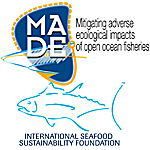In 2010 the International Seafood Sustainability Foundation (ISSF) started facilitating bycatch reduction workshops worldwide for tuna purse seine skippers. Captains and navigators with understanding in FAD (Fish Aggregating Devices) fishing were targeted. Other important fleet members such as ship-owners, fleet managers, deck bosses, and crew with technical knowledge are also invited. These “Skipper Workshops” pursue the identification of best fishing options to reduce bycatch of small tuna, turtles and sharks with the help of fishers. The workshops feed into the ISSF's broader Bycatch Project, which supports the chartering of commercial purse seiners for research trips to develop and test better bycatch reduction solutions. At the workshops scientists present skippers with results of the trials conducted at sea (Eastern Pacific, Indian Ocean, and Western Pacific Ocean trips to date), and planned activities for forthcoming trips. The concepts discussed include the development of non-entangling FADs, attraction of sharks away from the FADs, use of selective echo-sounder buoys, manipulation of bycatch species in the net, or best release practices for sharks and turtles. The fisher's feedback is carefully considered at the ISSF Bycatch Steering Committee, influencing decisions on which investigation areas to prioritize in future research cruises. In addition, the local regional knowledge provided for each ocean and type of vessels they use, helps identify important differences between fleets and regions to create “tailor-made” measures. Direct involvement of skippers in finding bycatch solutions improves results and promotes ready adoption of measures.
- Presentation

 PDF version
PDF version
